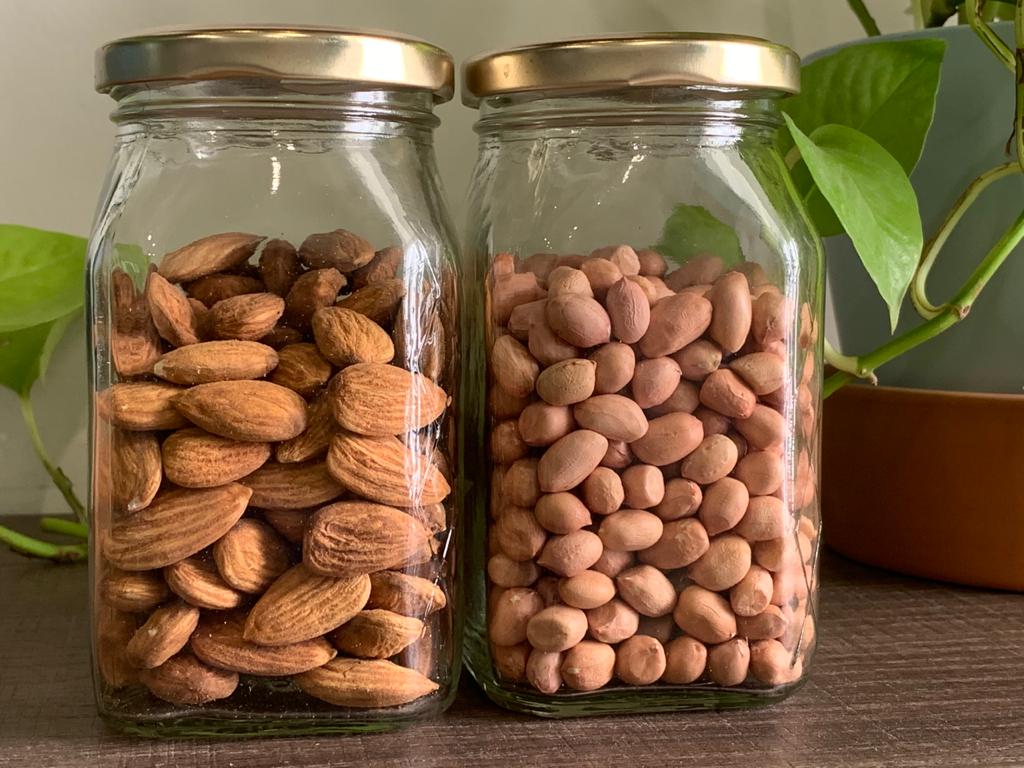Peanuts or Almonds: The Ultimate Nutritional Showdown

In recent years, peanuts and almonds have become increasingly popular as healthy snacks. Not only are they delicious, but they also offer a wide range of nutritional benefits. These nuts are packed with essential nutrients supporting overall health and well-being. From protein and healthy fats to vitamins and minerals, peanuts and almonds are a powerhouse of nutrition.

Nutrient Profile: A Comparison of Peanuts and Almonds
Regarding macronutrients, peanuts and almonds have some similarities but also some differences. Both nuts are good sources of protein, healthy fats, and dietary fiber. However, almonds have a slightly higher fat content than peanuts. On the other hand, peanuts contain more carbohydrates than almonds.
In terms of micronutrients, both peanuts and almonds offer a variety of essential vitamins and minerals. Peanuts are rich in vitamin E, niacin, folate, and manganese. Conversely, almonds are an excellent source of vitamin E, magnesium, calcium, and iron.
Protein Powerhouses: Which Nut Reigns Supreme?
Protein is an essential nutrient that is crucial in building and repairing tissues, supporting immune function, and maintaining overall health. Regarding protein content, peanuts and almonds are both excellent sources.
Peanuts contain approximately 25 grams of protein per 100 grams, while almonds contain around 21 grams of protein per 100 grams. While peanuts have a slightly higher protein content, it’s important to note that protein quality is also important.
Healthy Fats: The Role of Peanuts and Almonds in a Balanced Diet
Both peanuts and almonds are rich in healthy fats that benefit overall health. These nuts contain monounsaturated fats, which can help reduce bad cholesterol levels and lower the risk of heart disease.
Peanuts are particularly high in monounsaturated fats, with approximately 49 grams per 100 grams. Almonds, on the other hand, contain around 44 grams of monounsaturated fats per 100 grams. These healthy fats can provide a feeling of satiety and help maintain a healthy weight.
Vitamins and Minerals: Which Nut Provides More Nutritional Value?
RPeanutsand almonds offer different nutritional profiles. Regarding vitamins and minerals, Peanuts are an excellent source of vitamin E, a powerful antioxidant that helps protect cells from damage. They also contain niacin, important for energy production, and folate, essential for cell growth and development.
Conversely, almonds are rich in vitamin E, magnesium, calcium, and iron. Vitamin E is important for skin health and immune function, while magnesium plays a role in muscle and bone health. Calcium is essential for strong bones and teeth, and iron is important for oxygen transport.
Fiber Content: How Peanuts and Almonds Can Help with Digestion
Both peanuts and almonds are high in dietary fiber, which is important for digestive health. Fiber helps promote regular bowel movements, prevent constipation, and support a healthy gut microbiome.
Peanuts contain approximately 8 grams of fiber per 100 grams, while almonds contain around 12 grams of fiber per 100 grams. Including these nuts in your diet can help improve digestion and promote overall gut health.
Weight Loss: Which Nut is Better for Shedding Pounds?
Peanuts and almonds can help with weight loss due to their nutrient density and satiating properties. However, they are also high in calories, so portion control is key.
Peanuts contain approximately 567 calories per 100 grams, while almonds contain around 579 calories per 100 grams. Despite the slightly higher calorie content, these nuts can still be included in a balanced diet for weight loss when consumed in moderation.
Heart Health: How Peanuts and Almonds Can Benefit Cardiovascular Health
Both peanuts and almonds have been shown to have heart-healthy benefits. The monounsaturated fats in these nuts can help reduce bad cholesterol levels and lower the risk of heart disease.
Additionally, peanuts contain resveratrol, a compound that has anti-inflammatory and antioxidant properties. On the other hand, almonds are rich in antioxidants, such as vitamin E, which can help protect against oxidative stress and inflammation.
Allergies and Sensitivities: Understanding the Risks and Benefits of Peanuts and Almonds
While peanuts and almonds offer numerous health benefits, it’s important to be aware of the risks associated with allergies. Peanuts are one of the most common food allergens and can cause severe allergic reactions in some individuals. Almonds can also cause allergic reactions in those with tree nut allergies.
However, consuming peanuts and almonds can provide a wide range of health benefits for those without allergies. These nuts can be nutritious to a balanced diet and support overall health and well-being.
Choosing the Nut that Best Suits Your Nutritional Needs
In conclusion, both peanuts and almonds offer a variety of nutritional benefits. They contain essential nutrients such as protein, healthy fats, vitamins, minerals, and fiber. Whether you prefer peanuts or almonds, incorporating these nuts into your diet can support overall health and well-being.
When choosing between peanuts and almonds, it’s important to consider your individual nutritional needs and preferences. Both nuts offer unique dietary profiles, so it’s a matter of personal preference. Whether you enjoy the creamy texture of peanuts or the crunchiness of almonds, both nuts can be a delicious and nutritious addition to your diet.



